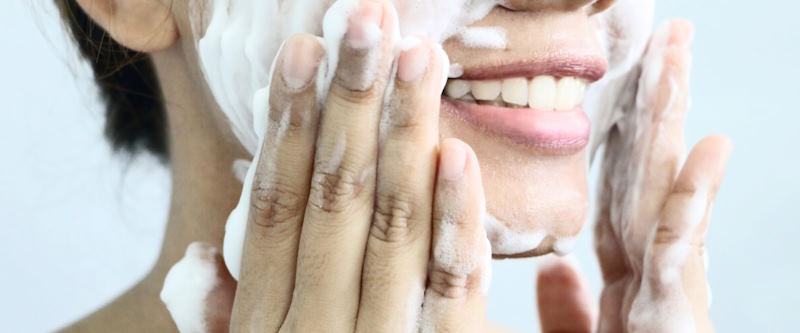Navigating the world of skincare can be particularly challenging for those with this skin type. Sensitive skin is delicate and requires a thoughtful and careful approach to avoid irritation and maintain its health.
Understanding and addressing sensitive skin needs is crucial for preventing adverse reactions and promoting a clear, calm complexion.
How is sensitive skin characterized?
Sensitive skin is characterized by its heightened reactivity to external factors, often resulting in discomfort and visible symptoms. People with sensitive skin may experience redness, itching, stinging, or burning sensations when exposed to certain skincare products, environmental conditions, or stress. This skin type is more prone to reactions from common irritants in many beauty and personal care products.
Sensitive skin is not a medical diagnosis but rather a condition that varies widely among individuals. Some people might experience occasional sensitivity, while others may deal with it persistently.
How can sensitive skin be damaged from incorrect care?
Incorrect care can damage sensitive skin in several ways, leading to increased irritation, discomfort, and long-term issues. Products with harsh ingredients, such as alcohol, sulfates, and synthetic fragrances, can strip the skin of its natural oils and disrupt the skin barrier. This disruption reduces the skin’s ability to retain moisture and defend against external irritants, resulting in dryness, flakiness, and heightened sensitivity.
Over-exfoliation is another common mistake that can damage sensitive skin. While exfoliating helps remove dead skin cells and promote cell turnover, doing it too frequently or using abrasive scrubs can cause micro-tears in the skin, leading to inflammation and irritation. Chemical exfoliants with high concentrations of active ingredients can also be too harsh, exacerbating sensitivity and causing redness or burning sensations.
Improper use of skincare products, such as layering too many active ingredients or using incompatible products, can further stress sensitive skin. For example, combining retinoids with strong acids without proper guidance can lead to excessive dryness and peeling. Not patch-testing new products can result in unexpected allergic reactions or irritations.
Incorrect care can also include using overly hot water when cleansing, which can strip the skin of essential lipids, or neglecting to moisturize adequately, leading to dehydration and a compromised skin barrier.

What are the essential components of a sensitive skincare routine?
Gentle Cleansing
Cleansing is critical in any skincare routine, especially for sensitive skin. Opt for a mild, fragrance-free cleanser that removes dirt and impurities without stripping the skin of its natural oils. Avoid products with harsh surfactants, such as sodium lauryl sulfate, which can cause irritation and dryness. Cleansing with lukewarm water instead of hot water can also help prevent further irritation.
Moisturizing
A good moisturizer helps maintain the skin’s barrier function and hydration levels. Choose a moisturizer formulated for sensitive skin, ideally one that is fragrance-free, hypoallergenic, and contains soothing ingredients like ceramides, hyaluronic acid, and glycerin. Moisturizing twice daily, especially after cleansing, can help keep the skin hydrated and protected.
Sun Protection
Daily sun protection is essential to prevent UV damage, which can exacerbate sensitive skin issues. Use a broad-spectrum sunscreen with at least SPF 30. Physical sunscreens containing zinc oxide or titanium dioxide are often preferred for sensitive skin as they are less likely to cause irritation compared to chemical sunscreens. Look for formulations that are fragrance-free and hypoallergenic.
Hydration
Keeping the skin hydrated from within is also important. Drink plenty of water throughout the day to maintain overall hydration, which can help support the skin’s barrier function.
Barrier Repair
Focus on products that help repair and strengthen the skin barrier. Ingredients like niacinamide, fatty acids, and ceramides are beneficial for restoring the skin’s natural protective barrier, reducing sensitivity, and improving resilience.
Minimalist Approach
A minimalist skincare routine with fewer products can be more beneficial for sensitive skin. Overloading the skin with multiple products and active ingredients can increase the risk of irritation. Stick to the basics: a gentle cleanser, a hydrating moisturizer, and a protective sunscreen.
By incorporating these essential components into your skincare routine, you can effectively manage sensitive skin, reduce irritation, and maintain a healthy, balanced complexion.

What are common myths about sensitive skin care?
Sensitive Skin Only Affects the Face
While the face is often the most visibly affected area, sensitive skin can occur on any body part. Symptoms like redness, itching, and irritation can manifest on the hands, scalp, or other areas, necessitating comprehensive care beyond facial skincare.
Natural Products Are Always Better for Sensitive Skin
There is a common misconception that natural or organic products are inherently safer for sensitive skin. However, natural ingredients can be just as irritating as synthetic ones. For instance, essential oils and certain botanical extracts can cause allergic reactions or irritation in sensitive skin.
All Hypoallergenic Products Are Safe for Sensitive Skin
Hypoallergenic products are formulated to minimize the risk of allergic reactions, but they are not guaranteed to be safe for everyone with sensitive skin. It’s essential to read ingredient lists and perform patch tests to ensure a product is suitable for your specific sensitivities.
You Can Cure Sensitive Skin
Sensitive skin is a manageable condition but not something that can be cured. While symptoms can be significantly reduced with the right skincare routine and lifestyle changes, the tendency towards sensitivity usually remains. Continuous care and attention are necessary to maintain skin health.
Sensitive Skin Is Always Dry
Sensitive skin can be dry, oily, or a combination of both. The common factor is reactivity, not moisture level. Understanding your skin type and sensitivity is essential for choosing the right products and treatments.
Sensitive Skin Is the Same as Allergic Skin
Sensitive skin and allergic skin reactions are different. Sensitive skin can react to various non-allergic irritants, while allergic reactions are immune responses to specific allergens. It’s important to distinguish between the two to manage the condition effectively.
Addressing these myths helps provide a clearer understanding of sensitive skin care, allowing individuals to make informed decisions and adopt routines that genuinely benefit their skin.


















